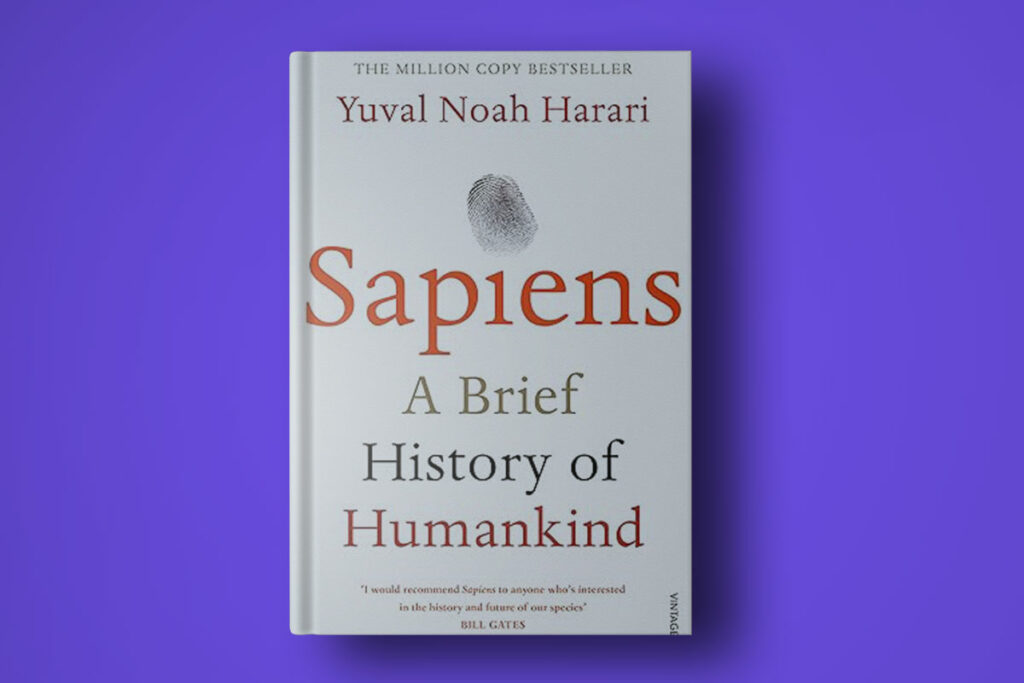
Yuval Noah Harari’s Sapiens: A Brief History of Humankind is a fascinating exploration of the history of our species. It takes readers on a journey from the earliest days of Homo sapiens to the present, offering deep insights into how humans have evolved, shaped their world, and been shaped by it. This article delves into the key themes and takeaways from Sapiens, highlighting why it is a must-read for anyone interested in understanding the complexities of human history and society.
The Cognitive Revolution
One of the central themes in Sapiens is the Cognitive Revolution, which Harari argues set humans apart from other species and laid the foundation for our domination of the planet. Around 70,000 years ago, Homo sapiens began to exhibit significant changes in behavior, thought, and communication. This revolution allowed for the development of complex language, enabling humans to share information, cooperate in large groups, and create shared myths and beliefs.
Key Takeaways:
- Language and Communication: The ability to communicate complex ideas and stories allowed humans to build larger, more cohesive communities.
- Shared Myths: Religion, culture, and societal norms emerged from the ability to create and believe in shared myths, fostering cooperation among large groups of strangers.
The Agricultural Revolution
The transition from hunter-gatherer societies to agricultural ones was another pivotal moment in human history, which Harari calls the Agricultural Revolution. This shift, occurring around 10,000 years ago, transformed human societies in profound ways, leading to the development of cities, states, and empires.
Key Takeaways:
- Domestication of Plants and Animals: The cultivation of crops and domestication of animals provided a more reliable food source, supporting larger populations.
- Social Stratification: The surplus of food allowed some individuals to pursue roles other than farming, leading to the emergence of different social classes and occupations.
- Rise of Civilizations: Permanent settlements and the accumulation of surplus resources paved the way for the development of complex societies and political structures.
The Unification of Humankind
Harari explores how human societies have moved from isolated communities to a globally interconnected world. Through trade, empires, and religion, humans have created a unified global culture, albeit with significant diversity and conflict.
Key Takeaways:
- Trade Networks: The exchange of goods, ideas, and technologies has connected disparate societies, leading to economic and cultural exchange.
- Empires: Conquest and colonization have spread cultural practices and innovations across the globe, though often through violent means.
- Religious and Ideological Systems: Religions like Christianity and Islam, as well as ideologies like capitalism and communism, have provided common frameworks for understanding and organizing the world.
The Scientific Revolution
The Scientific Revolution, beginning in the 16th century, fundamentally altered humanity’s understanding of the world and our place in it. Harari discusses how scientific advancements have driven unprecedented changes in society, technology, and the economy.
Key Takeaways:
- Empirical Knowledge: The shift towards empirical observation and experimentation has led to significant technological and medical advancements.
- Industrialization: The Industrial Revolution transformed economies and societies, leading to urbanization, mass production, and increased standards of living.
- Modern Science: Advances in fields like biology, chemistry, and physics have reshaped our understanding of everything from the human body to the universe.
The Capitalist Creed
Harari examines capitalism’s role in shaping the modern world. He describes capitalism not just as an economic system, but as a cultural and ideological force that has driven human progress and innovation, as well as inequality and environmental degradation.
Key Takeaways:
- Economic Growth: Capitalism has fueled unprecedented economic growth, innovation, and improvements in quality of life.
- Market Dynamics: The focus on free markets and competition has led to significant technological advancements and efficiency.
- Inequality and Environmental Impact: The pursuit of profit has also contributed to economic inequality and environmental challenges, raising questions about sustainability and social justice.
The Anthropocene Epoch
Harari argues that humans have become a geological force, ushering in a new epoch known as the Anthropocene. This era is characterized by the significant impact humans have on the Earth’s ecosystems and climate.
Key Takeaways:
- Environmental Impact: Human activities, from deforestation to carbon emissions, are altering the planet in ways that may have long-term consequences.
- Sustainability Challenges: Addressing issues like climate change, biodiversity loss, and resource depletion requires global cooperation and innovative solutions.
The Future of Homo Sapiens
In the final chapters of Sapiens, Harari speculates on the future of our species. He explores possibilities like genetic engineering, artificial intelligence, and the quest for immortality, raising important ethical and philosophical questions.
Key Takeaways:
- Genetic Engineering: Advances in biotechnology could allow humans to alter their genetic makeup, potentially eradicating diseases but also raising ethical concerns.
- Artificial Intelligence: AI has the potential to transform economies and societies, but also poses risks related to employment, privacy, and autonomy.
- Transhumanism: The quest to enhance human capabilities and extend life raises questions about the nature of humanity and what it means to be human.
Analyzing Harari’s Perspectives
Harari’s Sapiens offers a comprehensive overview of human history, but it also invites readers to critically evaluate his perspectives. Here are some areas where readers might reflect on Harari’s arguments:
1. Human Exceptionalism
Harari challenges the notion of human exceptionalism by presenting humans as one of many species on Earth. This perspective encourages readers to consider the impact of human actions on other species and the planet.
2. The Role of Fiction
Harari posits that the ability to create and believe in shared myths and fictions is a defining characteristic of Homo sapiens. This idea can lead to a deeper understanding of the power of stories and ideologies in shaping human societies.
3. Progress and Its Costs
While Harari acknowledges the advancements brought by revolutions like the Agricultural and Scientific Revolutions, he also highlights the costs, such as social inequality and environmental degradation. This balanced view prompts readers to consider the complexities of progress.
Global Impact of Sapiens
Since its publication, Sapiens has had a significant global impact, sparking discussions across diverse fields. Here are a few ways the book has influenced readers and thinkers worldwide:
1. Academic Discourse
‘Sapiens has been widely discussed in academic circles, with scholars from various disciplines engaging with Harari’s ideas. It has become a popular text in university courses on history, anthropology, and sociology.
2. Public Awareness
The book has raised public awareness about key historical and contemporary issues, such as human evolution, social inequality, and environmental sustainability. Its accessibility has made complex topics understandable to a broad audience.
3. Policy and Leadership
Leaders and policymakers have cited Sapiens as an influential work that informs their understanding of human history and contemporary challenges. The book’s insights have been used to frame discussions on global cooperation, technological development, and ethical considerations.
Personal Reflections
Readers often find that Sapiens prompts personal reflection on their own lives and beliefs. Here are some common themes that resonate with readers:
1. Identity and Belonging
Harari’s exploration of shared myths and cultural narratives encourages readers to reflect on their own identities and the stories that shape their sense of belonging.
2. Ethical Choices
The discussion of scientific and technological advancements raises ethical questions that prompt readers to consider their own values and the impact of their choices on future generations.
3. Environmental Responsibility
Harari’s emphasis on the Anthropocene epoch and human impact on the environment inspires readers to think about their responsibility towards the planet and to consider sustainable practices.
Further Reading and Resources
For those interested in exploring the themes of Sapiens further, there are numerous resources and related books available. Here are a few recommendations:
1. Homo Deus: A Brief History of Tomorrow by Yuval Noah Harari
In this follow-up to Sapiens, Harari explores the future of humanity, delving into topics such as artificial intelligence, genetic engineering, and the quest for immortality.
2. Guns, Germs, and Steel: The Fates of Human Societies by Jared Diamond
Diamond’s book offers an analysis of the factors that have shaped human societies, providing a complementary perspective to Harari’s historical narrative.
3. The Sixth Extinction: An Unnatural History by Elizabeth Kolbert
Kolbert’s book examines the impact of human activity on biodiversity and the environment, echoing Harari’s concerns about the Anthropocene epoch.
4. Thinking, Fast and Slow by Daniel Kahneman
Kahneman’s exploration of human decision-making processes provides insights into the cognitive abilities that Harari discusses in the Cognitive Revolution.
Engaging with Sapiens through Audio Book Summaries
For those who prefer to consume information through audio formats, audio book summaries can be an excellent way to engage with the key ideas of Sapiens. BookBits offers a detailed summary of Sapiens, highlighting the main arguments and providing additional context.
Benefits of Audio Book Summaries
- Convenience: Listen to summaries on the go, whether you’re commuting, exercising, or doing household chores.
- Time-Saving: Get the key insights from the book in a fraction of the time it takes to read the full text.
- Enhanced Understanding: Summaries provide a concise overview, making it easier to grasp and remember the main points.
By leveraging these summaries, you can quickly and efficiently engage with Harari’s thought-provoking ideas and apply them to your own understanding of human history and society.
Conclusion: The Significance of Sapiens
‘Sapiens is more than just a history book; it’s a thought-provoking examination of what it means to be human. Harari’s ability to weave together insights from history, biology, anthropology, and economics provides a comprehensive understanding of our species’ past and potential future. Here are a few reasons why Sapiens is a must-read:
- Holistic Perspective: Harari’s interdisciplinary approach offers a well-rounded view of human history, connecting the dots between various fields of study.
- Engaging Narrative: The book is written in a captivating and accessible style, making complex ideas understandable and engaging for readers.
- Provocative Ideas: Harari challenges readers to think critically about human progress, ethical dilemmas, and the future of our species.
Understanding the history and evolution of Homo sapiens is crucial for navigating the complexities of the modern world. Sapiens by Yuval Noah Harari offers valuable lessons and thought-provoking questions that can help us reflect on our past, understand our present, and contemplate our future. Whether you’re a history enthusiast, a student of human behavior, or simply curious about our species, Sapiens is a transformative read that can broaden your perspective and deepen your understanding of what it means to be human.
For more insights and summaries of influential books like Sapiens, subscribe to BookBits and explore our extensive library of audio book summaries. By leveraging these resources, you can stay informed and inspired on your journey of lifelong learning.


